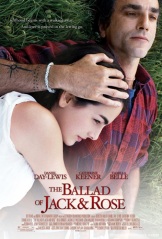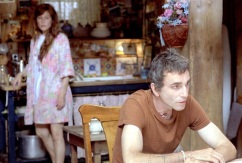|
The Ballad of Jack and Rose |
| |
 |
USA, 2005. Rated R. 111 minutes.
Cast: Daniel Day-Lewis, Camilla Belle, Catherine Keener, Paul Dano, Ryan McDonald, Jena Malone, Beau Bridges, Jason Lee
Writer: Rebecca Miller
Music: Michael Rohatyn
Cinematography: Ellen Kuras
Producer: Lemore Syvan
Director: Rebecca Miller
LINKS
|
 ose and the Snake, the working title of the new film from writer/director Rebecca Miller (Personal Velocity) is so much more intriguingly appropriate than its actual title. The Ballad of Jack and Rose calls to mind an effete guy in purple tights with a lute, or maybe a Bob Dylan number. Rose and the Snake evokes so much more—a Garden of Eden, an innocent girl introduced to forbidden knowledge and/or carnal desires, and of course, actual serpents. The Ballad of Jack and Rose has all those things.
ose and the Snake, the working title of the new film from writer/director Rebecca Miller (Personal Velocity) is so much more intriguingly appropriate than its actual title. The Ballad of Jack and Rose calls to mind an effete guy in purple tights with a lute, or maybe a Bob Dylan number. Rose and the Snake evokes so much more—a Garden of Eden, an innocent girl introduced to forbidden knowledge and/or carnal desires, and of course, actual serpents. The Ballad of Jack and Rose has all those things.
Meet 16-year-old sugar magnolia Rose (Camille Belle) and her skeletal father Jack (Daniel Day-Lewis). The year is 1986, and the two occupy the ramshackle remnants of a Sixties commune on an island somewhere off the East Coast of the United States. Jack and Rose, whom Jack has home schooled since the age of eleven, have little contact with the outside world. Seeming more like husband and wife than father and daughter, the two share a complicated, intimate routine. All is not peace, love, and understanding, however. When a truck arrives at a construction site that Jack believes encroaches on protected wetlands, Rose knows the drill. She wordlessly fetches Jack his prehistoric rifle, so he can chase off the workers and rant, “This is not a house! It's a thing to keep the TV dry!” Jack likes to go around telling people (well, Jason Lee anyway) that they're being exploited, and offering them loans so they can set up a business of their own. Jack is loaded, you see, which does tend to take some stress out of running a self-sufficient commune. Anyway, Jack's feud with Marty the developer (Beau Bridges) proves to be an ongoing subplot. (Tangential question: why would anyone leave bulldozers unattended on a construction site when there's a vandal on the loose?)
This film isn't about Jack's political beliefs or his money, though. It's about Rose needing to separate from Jack. Despite being practically a woman grown, when it comes to social and romantic interactions Rose may as well be Lennie from Of Mice and Men. With no other man upon whom to direct her attentions, Rose has developed an uncomfortably intimate attachment to her father. She decides that if Jack dies, she will die, too. “If you die, there will have been no point to my life,” Jack admonishes her. Not a purely theoretical scenario, by the way. Jack is not at all well.

Catherine Keener and Daniel Day-Lewis star in The Ballad of Jack and Rose. |
Jack finally senses he needs to do something, and goes off to find a snake to introduce into the garden. He keeps an occasional girlfriend on the mainland, Kathleen (Catherine Keener), who has two teenage sons of her own, each by a different father (red flag). He invites them to come live on the commune, and offers Kathleen a generous “early retirement package” to make it possible. “It's an experiment,” he explains to Rose—words he will come to regret.
Angry not to have her father to herself, and at being replaced as his object of romantic affection (at least in her mind), Rose lashes out with her own experiments, some of them with Kathleen's children, gentle Rodney (Ryan McDonald) and bad-boy Thaddius (Paul Dano). Suddenly her childhood is destroyed, just like her beloved tree house after a violent storm. Yet still she has no idea how to relate to people. Her attention-seeking games are no more sophisticated than those of a six-year-old, but they are far more destructive. As someone observes in the movie, truly innocent people are dangerous.
Rebecca Miller develops her story unhurriedly, allowing all necessary time for character development. She avoids smothering the film with too much overt symbolism (serpent excepted), though Jack's illness is too convenient a device. Something odd happens, though, on the way to concluding Rose's coming of age story. It becomes more Jack's coming of age story—a shift in emphasis that Miller freely acknowledges in interviews. Jack's own naïveté must end as he confronts the possibility that he has permanently ruined his daughter, and that his feud with Marty may have as much to do with his own stubborn intransigence as it does with the inherent evils of suburban tract housing.
Jack's realizations, particularly vis-à-vis his daughter, offer rich dramatic possibilities. Nonetheless, the shift is a bit awkward in that it crowds out Rose's development, which not only had been the story's original focus, but also becomes more inscrutable as it grows more bizarre. Day-Lewis sometimes is too brilliant an actor for his own good. There is a natural tendency for filmmakers to want to make him the center of attention—particularly (one would think) if they're married to him, as Rebecca Miller is—even when it may not be appropriate. This was the case in Gangs of New York, wherein the more Day-Lewis chewed up scenery, the less the story served anyone else. In The Ballad of Jack and Rose, the resolution of Rose's story remains a cipher, and the irrelevant epilogue offers no help in decoding it.
Review
© April 2005 by AboutFilm.Com and the author.
Images © 2005 IFC Films. All Rights Reserved.


